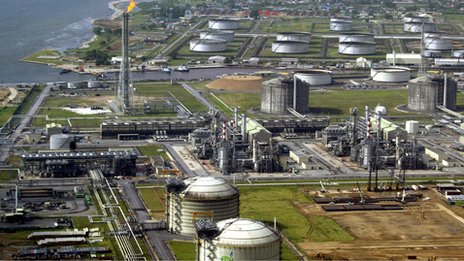
Nigeria imports most of its fuel despite being Africa's biggest oil producer
Africa’s wealthiest man, Aliko Dangote, has signed a multi-billion dollar deal with banks to finance the building of an oil refinery in Nigeria.
The refinery would be the largest in Africa, turning Nigeria into a petroleum exporter, he told the BBC.
Nigeria is Africa’s biggest oil producer but lacks refining capacity and has to import most of its fuel.
The West African state is often hit by fuel shortages, and conflict over control of its oil wealth.
People in Nigeria’s oil-producing southern Niger Delta region are among the country’s poorest and accuse the government and oil companies of failing to develop the area.
‘Dilapidated refineries’
Mr Dangote, a Nigerian who made his fortune in cement, flour and sugar, is worth an estimated $16bn (£10bn) and has topped the Forbes list of Africa’s richest men for the past three years.
Mr Dangote told the BBC’s Focus on Africa programme the refinery would create “thousands” of jobs.
It would be built in the south-west and would become operational in 2016, he said.
Mr Dangote signed a $3.3bn loan deal with local and foreign banks to build the refinery, as well as fertiliser and petrochemical plants.
The entire venture would cost $9bn, with $3bn in equity from Dangote Industries and $6bn to be raised in loan capital.
The initial loan facility was co-ordinated globally by Standard Chartered and in Nigeria by Guaranty Trust Bank, London’s Financial Times newspaper reports.
“At least for the first time in our lifetime, we’ll see Nigeria exporting petroleum products,” Mr Dangote told Focus on Africa on the BBC World Service.
“We’ll also see Nigeria for the first time exporting fertiliser rather than using hard-earned foreign exchange to import fertiliser,” he added.

Nigeria currently imports more than three-quarters of its fuel despite being the continent’s biggest producer.
Although it has two refineries in the Port Harcourt area, neither runs at full capacity.
Previous efforts to repair Nigeria’s dilapidated refineries and build new ones have been scuppered to protect the interests of powerful fuel importers, some of whom have been linked to a subsidy scam costing the country billions of dollars a year, correspondents say.
Fuel in Nigeria is sold at a subsidised price. A government attempt to remove the subsidy in 2012 led to nationwide protests. The plan was subsequently dropped.
Last year an investigation revealed that in two years, more than $6bn was lost in a fuel subsidy scam.

“At least for the first time in our lifetime, we’ll see Nigeria exporting petroleum products”
Aliko Dangote Businessman



Leave a reply